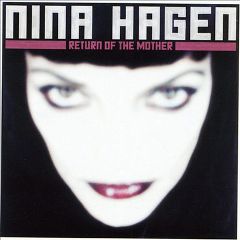Nina Hagen - Return Of The Mother (2000)
Nina Hagen - Return Of The Mother (2000)

1 Return Of The Mother 4:36 2 Der Wind Hat Mir Ein Lied Erzählt 3:49 3 Schachmatt 5:07 4 Frequenzkontrolle 4:57 5 Poetenklub 5:03 6 Höllenzug 3:22 7 Schüttel Mich 3:51 8 Yes Sir 4:05 9 Handgrenade 4:31 10 He Shive Shankara 5:47
It had indeed been a few years since Nina Hagen's last regular album ("Freud Euch" and its English version "Bee Happy" in 1995), so there was reason enough to be curious about what the title of the new album, Return of the Mother, might portend. It turns out that the whole album is devoted to balancing the ambivalence contained in that title: the possible sinister undercurrent as well as the advent of sheltering care. The mother figure of the title track is revealed to mean a kind of caring divine principal, not bound to any one religion but common to all. Throughout the album (mostly sung in German but with English interjections) lots of well meaning good advice to humanity gets contrasted with none too clear warnings, all set on a musical backdrop of often sinisterly weighty and elaborate dance/rock arrangements. Early on, "Schachmatt" concentrates the combination of apocalyptic outlook and plea for change, but a number of songs veer off to scenarios of their own. Two of them are covers of songs from the repertoire of Zarah Leander, transposing them from pre-war Berlin to the dancefloors of the 21st century. "Poetenclub" is a unique kind of tribute to Austrian singer Falco who died in 1998: using samples of his voice we get a sort of dialogue between Nina Hagen and him, to underscore how souls live on. It's more of a meditation than a song, and that points to what has to be said that the album lacks: tunes. As usual with Nina Hagen, her energy is all over the place, she remains a unique, ever-changing vocal powerhouse, but melodic content just isn't a strength of this particular album. Even so, "Schüttel Mich," a fun and funky song of seduction, has hit quality, and when the electronics make way for a non-synthetic percussive backing on the Hindu chant of the closing "He Shiva Shankara," the album finds a distinctly melodic ending. --- Alan Severa, allmusic.com
yandex mega mediafire ulozto gett
Last Updated (Sunday, 16 September 2018 20:10)








